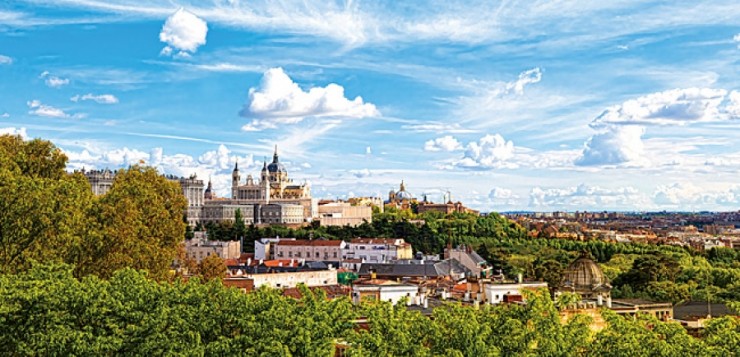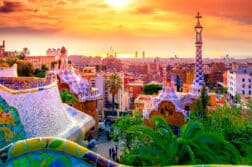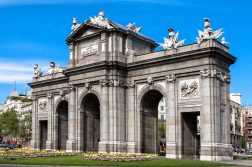Spain is known for its climate, cuisine, culture and nightlife, but one of the greatest opportunities that Spain has to offer is that you can enjoy all of this while you learn the language spoken by almost 500 million people worldwide. In fact, Spanish is the official language 20 countries!
For decades, Spain has received a multitude of visitors from the cold and damp lands of the north, drawn by the sociability of its people and the reliability of its summer climate; but this complex country offers much more than sun.
Spain is impregnated with the history of the Roman Empire and Arab domination, the conquistadors, the artistic legacy of Goya, Velázquez, Picasso and Dalí, novels of chivalry, and the presence and influence of international artists and intellectuals.
Spain is situated in southwest Europe, between the Atlantic Ocean and the Mediterranean Sea. This advantageous position offers a temperate climate with more than 250 days of sun per year. Spain offers all its visitors a wide range of possibilities for travel, enjoyment, relaxation and the opportunity to learn about its history, its folklore or its language. Its landscapes are broadly varied: from the deserts of Andalusia to the green meadows of Galicia; from the arid plains of Castile to the snowy peaks of the Picos de Europa and the Pyrenees.
Spain is chosen annually as a study destination by thousands of students from across the world. There is an ideal option for every student, from small schools with 20 students, to universities of international renown in different cities.
Travel in Spain
Spain has many international airports, such as those of Madrid, Barcelona, Bilbao, Santiago de Compostela, Seville, Malaga, Alicante. Another good option is to travel by train. Regular rail services connect Spain with the main cities of France, Portugal and the rest of Europe. Travelling to Spain by railway may be more expensive than travelling by coach, except for passengers under the age of 26 or those who hold an Interrail ticket. Spain is connected by ferry with the United Kingdom and Morocco.
Spain is one of the more affordable European countries. Staying in a clean and comfortable hotel room, eating out, using public transport, and visiting the occasional museum requires a budget of little more than 40 dollars per day. With 100 dollars per day you can choose excellent accommodation, rent a car and enjoy the best food that Spain can offer.
Hotels and restaurants, especially those of the mid-high price range, accept credit and debit cards. These are also accepted in railway stations, when purchasing long distance tickets. Nowadays, ATM cash points, where it is possible to withdraw Euros from your account at home, are installed even in the smallest of locations. Tourists are the main target of pickpockets, so it is recommendable to take precautions when carrying cash.
Restaurants include a service charge in their menus. Tipping is, therefore, a personal choice. If they are satisfied, most people acknowledge the service received with some coins: 5% of the bill is more than enough. Spanish people usually leave a few coins on the tables of bars and cafés. In Spain, the only places where it is appropriate to haggle are street markets and cheaper hostels.
Cultural events and holidays
Cultural events are celebrated in a big way and are marked with public holidays, in the purest Spanish style.
At the end of February, the whole country celebrates the Carnival. The most enjoyable and best-known ones take place in Cadiz (Andalusia) and the Canary Islands.
Easter is celebrated during the days leading up to Easter Sunday (March or April). For this occasion, processions are prepared where the participants go through the streets carrying images of holy figures. To enjoy the best of these, it is advisable to go to Seville (Andalusia), although it is necessary to reserve accommodation well in advance.
For a whole week in June, the arrival of summer is celebrated with the Fiestas de San Juan in Alicante (Mediterranean Coast). Fireworks are combined with picturesque processions, culminating in the burning of the ninots (giant effigies dedicated to the most important political and social events of the year), while people dance and drink throughout the night.
Madrid is one of the European capitals with the most vibrant cultural life. Museums, exhibitions, theatres, musicals, as well as restaurants and nightlife abound.
At the end of May, and lasting a month, the most important bullfighting event in the world takes place: The Feria de San Isidro.
The most famous celebration of Spain is the Sanfermines of Pamplona, beginning on 7 July.
On the last Wednesday of August, the Valencian town of Buñol goes mad with the Tomatina, a fiesta in which they dispose of the surplus tomato crop, throwing them at people in a kind of friendly riot.
Spanish Language Schools
What better place than Spain to learn Spanish?
The variety of destinations, schools and courses makes learning Spanish in Spain easy and fun. Studying Spanish is an investment for the future. It can help you in your academic or professional career – or, if you are not careful in making your choice, it can be a bad experience. It is very important to look for quality schools and not to decide by price alone. Below we give you some tips on how to find the right school.
Dates and destinations
Before organising your trip, you will have to decide when and where to go. Spain is a warm country, but don’t expect to go to the beach in January. The best time to travel to Spain is from May to September, when you will find a warm, dry climate, sun and a good atmosphere wherever you go. If you decide to travel at a different time, find out about the climate you are going to encounter, temperatures and probabilities of rain.
Dependability of the school
If a school does not have a reliable web page or does not answer your questions clearly, avoid it. It is essential that you are clearly informed of the price of the course and of the accommodation, but make sure you also know whether there is any kind of enrolment fee, whether you have to pay for the books separately, or if there are any other hidden costs. Investigate online and through social media to find real information about the different schools.
Courses and programmes
You will find a wide variety of programmes depending on the school, the duration of the programme, and the topics to be studied. A university student will not be offered the same programme as a working professional. Keep looking until you find the ideal course.
The ‘Intensive’ course offered by the majority of schools comprises 20 Spanish lessons and a complementary programme of activities. Classes may be taken in the morning or the afternoon. On this basis, you will find specialized courses for juniors, professionals, university students or retired people, for example. You will also be considered a student if you wish to complete work experience or a programme of voluntary work.
Materials and Classes
The classes at a quality school should not have more than nine students per classroom. It is obvious that the fewer the students, the more you will benefit from the class. It is very important that both the materials and the teacher are of high quality. During your courses you must have the opportunity to participate and feel part of the class. An international and pleasant atmosphere is very important in order to benefit from the courses and learn as well as possible. To assure yourself of this, look for accreditations of quality, references or descriptions of the classes. If it is written down, they have to comply with it.
Cultural Activities
Don’t hesitate to ask about the programme of activities offered by your school. This is a great opportunity to discover the city where you are studying and get to know more people with whom you can practice Spanish during your stay. The schools that offer this will send you details. Our advice: combine culture and fun (museums and tapas, for example).
Accreditations and Quality Seals
There is no obligatory accreditation in Spain for centres that provide courses in Spanish as a foreign language, but there are different optional accreditations and associations of schools. These accreditations and associations allow you to decide which school to study at according to clear quality standards. We describe two of these below.
Accredited Centres of the Instituto Cervantes
Only centres that offer the highest quality in the teaching of Spanish in Spain may belong to this select club. The IC is the government body responsible for promoting the learning of Spanish and its quality. Consider this seal as a minimum to ensure quality teaching. www.cervantes.es
Regional associations and FEDELE
Each region or autonomous community has an association of schools of Spanish as a foreign language, which is self-managed and serves as a quality reference. FEDELE brings all the associations together in a Federation. www.fedele.org
You can also find information on the schools in Spain via their representatives in your town or the specialized agencies.
Visas
Students with Canadian nationality do not require a visa for stays of less than 90 days. Residents of Canada but who are nationals of another country should check with the Spanish embassy or consulate regarding the requisites for entering Spain.
Contributed by:
David Sampere, Director
Estudio Sampere – Madrid
www.sampere.es
david@sampere.es







